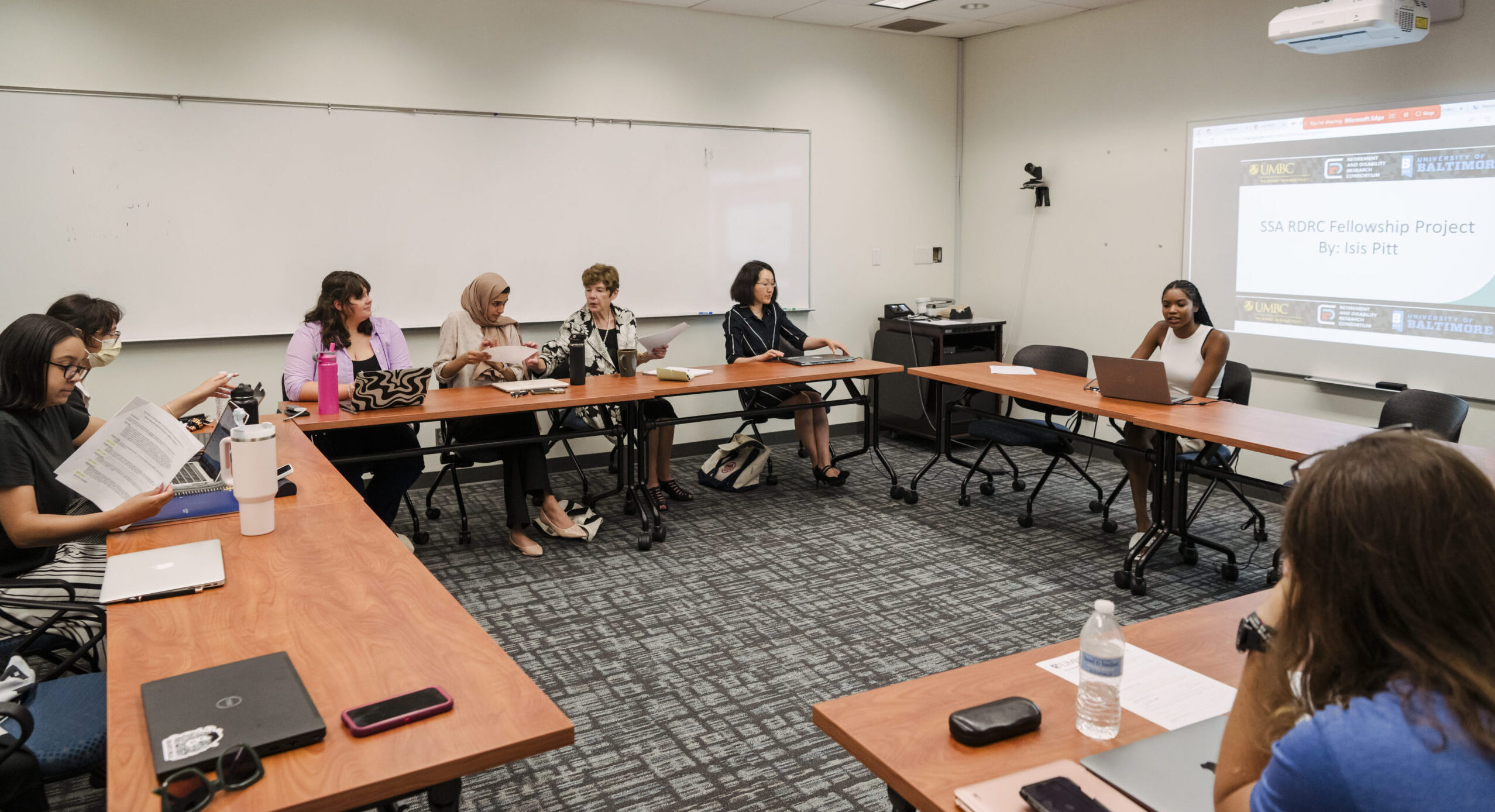As an undergraduate student at Earlham College in Richmond, Indiana, Nancy Miller, professor of public policy, participated in a National Science Foundation grant-funded program to train students in academic research. Miller traveled throughout Indianapolis, gaining skills in interviewing participants and managing data to investigate how the school, health, and justice systems coordinated child welfare cases. A spark was lit, and Miller has been doing research ever since for the Centers for Medicare and Medicaid Services, the National Institute of Disability and Rehabilitation Research, and now, the Social Security Administration (SSA).
Miller, in collaboration with colleagues at the University of Baltimore, is now offering undergraduate students here a similar research experience to her own in college. She is the lead principal investigator (PI) on a 5-year cooperative agreement from the SSA to support the Retirement and Disability Research Consortium (RDRC) program. Joining her as co-directors are Lisa Lynch, a professor of social and economic policy at Brandeis University’s Heller School for Social Policy and Management and director of the Institute for Economic and Racial Equity, and Jarnee Riley ’97, mathematics, associate vice president at Westat, a Maryland-based company that provides research services to government agencies and businesses. The five-year, multimillion-dollar cooperative agreement requires the team to submit each year’s research, training, and dissemination plan and an activity and budget proposal to SSA, which then reviews and releases the necessary funds.
The RDRC cooperative agreement—Promoting Equity in Retirement, Disability, and Health—is focusing on three research areas: equity in access to Social Security retirement for underserved people, the intersection of health and access to healthcare and equitable Supplemental Security Income (SSI) and SS Disability Insurance (SSDI) program participation, and disparities in SSI/SSDI program access and participation.
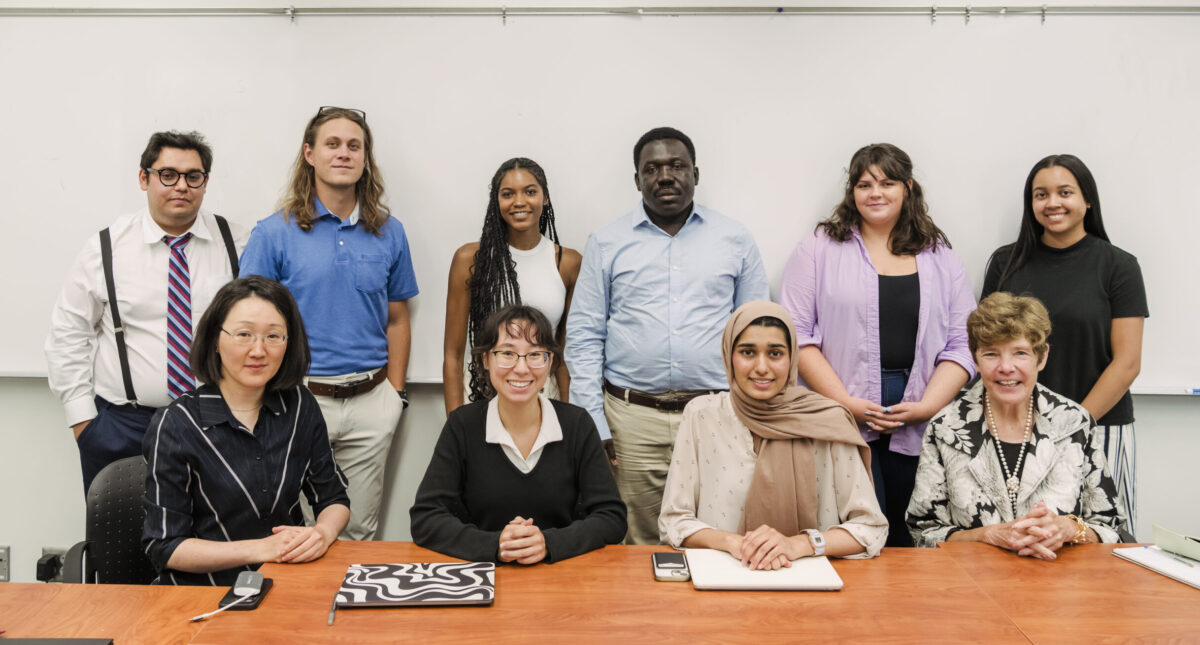
“We’re training students to conduct relevant Social Security-related research at various points in their academic careers,” Miller explains. This includes a mentored undergraduate summer research program housed at UMBC and UB; a doctoral fellowship program; dissertation grants for research on retirement, health, and disability; and mentoring for early scholars as they conduct pilot studies and academic papers. “The consortium aims to create a diverse pipeline of new scholars interested in SSA and its programs and to increase research interest in this area,” says Miller. To meet this goal, the SSA supports research and engages with minority-serving institutions like UMBC and UB.
This summer marks the end of their first six-week cohort of undergraduates gathering to learn about the research skills needed to deepen the understanding of the cross-cutting issues of the SSA programs.
Faculty as students and mentors
Miller who primarily works with graduate and doctoral students at UMBC’s School of Public Policy was thrilled to engage with UMBC’s undergraduate students, especially since it meant collaborating with her former mentee and long-term research partner, Yu “Sunny” Kang, M.P.P. ’06, and Ph.D. ’09, gerontology. Kang is an associate professor of public policy at the University of Baltimore’s School of Health and Human Services, where she has dedicated the past 12 years to working with nontraditional adult undergraduate students.
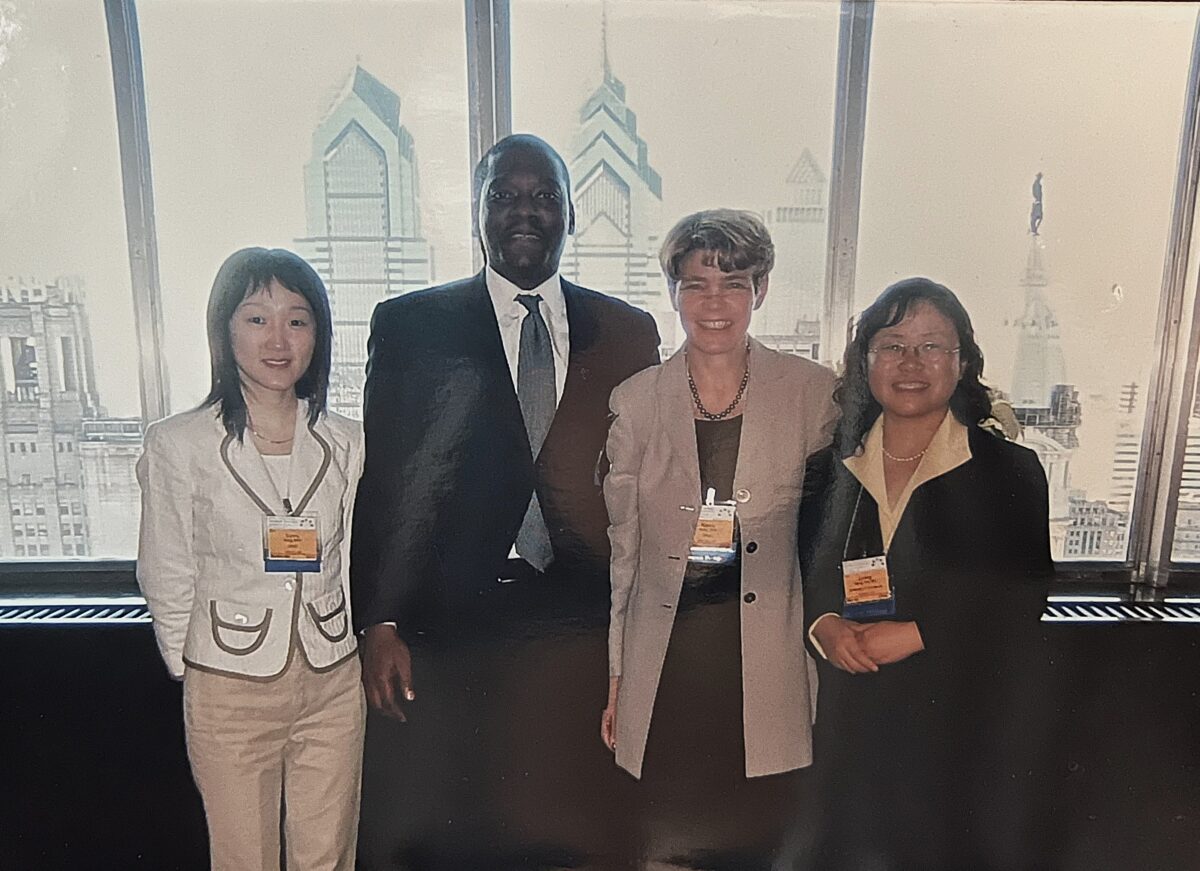
Kang began her master’s in the early 2000s and found a kindred spirit in Miller, who served as her dissertation chair. They began publishing research together during Kang’s master’s program and have continued to publish in journals like Archives of Gerontology and Geriatrics, Journal of Nursing Care Quality, The Gerontologist, and Medical Care Research and Review. “I was fortunate to publish before I graduated. Those opportunities helped me in my understanding of the field and my career,” says Kang. She researches health disparities in long-term care settings among underserved populations, the role of government in mitigating these disparities, and how Medicare and Medicaid shape healthcare delivery and access. “Nancy kept mentoring me afterward and offering career advice. That’s why we continue to work together.” Kang has implemented that same mentorship approach with her students.
To develop the six-week summer undergraduate research fellowship, Miller and Kang worked with David Mitch, professor and chair of economics at UMBC, fellow UMBC alum and UB colleague Ting Zhang, M.A. ’03, intercultural communications, the associate director of the Jacob France Institute, and Riley, who helped design the topics for the summer fellowship and helped select fellows.
The first cohort comprised five UMBC students and three UB students across the social and natural sciences. Fellows received a $7,500 stipend to learn various research methods and then apply these new skills to research a topic of their choice related to equity in retirement, health, and disability. Fellows had a mix of opportunities to learn and engage via in-person classes, independent and group research, and one-to-one mentorships. Kang, Miller, and Zhang—who is an associate professor of finance and economics at the Merrick School of Business—taught classes and mentored fellows. Mitch mentored Hala Malik, a political science sophomore at UMBC, who worked with Mitch on her research “Supplemental Security Income and Child Enrollment Based on Family Structure.”
“We are engaging students who may have never heard of Social Security, Social Security Disability Insurance, and Supplemental Security Income to get them excited about the opportunities and issues associated with them,” explains Miller. “We’re trying to focus on young and very early career people who may not be thinking about research and training in this area, introduce them to this area, and get them excited about it.”
Collaboration and independence
When Molly Quinn Walker became a Retriever, she was certain that political science would be her major and her career would center on policy. “My grandfather loved explaining the policy behind the news to me,” Quinn Walker explains. “Often, as I sit in classes, I feel like I’m drawing on nearly a decade of knowledge to reflect on public policy.”
Quinn Walker, now a senior political science major, learned about the Promoting Equity in Retirement, Disability, and Health fellowship in Miller’s Politics of Health class. “It’s probably one of my favorite classes because it was very conversation-based. Dr. Miller had so much information to share,” says Quinn Walker. “Each week, we went over a different section of health policy and discussed where it began, when it was enacted and why, what it was addressing, and how difficult it was to get that policy placed.”
The fellowship offered Quinn Walker yet another opportunity to learn from Miller. “Dr. Miller helped me fine-tune my idea and was extremely helpful in finding each of the data I utilized in the project,” says Quinn Walker. This feedback led her to research “The Life Expectancy Inequalities of Social Security Beneficiaries.” She also found the structure of the fellowship fostered collaboration and independence. Kang, Miller, and Zhang held online lectures to introduce the SSA programs from a social science perspective and met in person to discuss ideas and give feedback. “Hearing about how the other fellows were structuring their research was very helpful for implementing my project,” says Quinn Walker.
Quinn Walker hopes to continue participating in the Promoting Equity in Retirement, Disability, and Health program in the coming years as she transitions from an undergraduate to a master’s student at UMBC’s School of Public Policy Accelerated Pathways Program, where she earns graduate credits while completing her undergraduate degree.
A mentorship powerhouse
Presenting his research findings was exciting for Jacob Bassetti, a UB student who participated in the summer fellowship. “I love talking about policy. I was so excited to share my results that I offered to be the first to present,” says Bassetti. Bassetti a policy, politics, and international affairs senior was preparing for his next academic journey at UB’s School of Law when his economics professor encouraged Bassetti to apply for the summer fellowship. “I love to challenge myself,” says Bassetti, who up until recently was working on construction crews who had jobs at UMBC and UB, but was always hoping he could be the student instead. Bassetti made his dream come true as an adult learner. “I have always wanted to do real work with the education that I’ve received. This was my first opportunity to do so.”
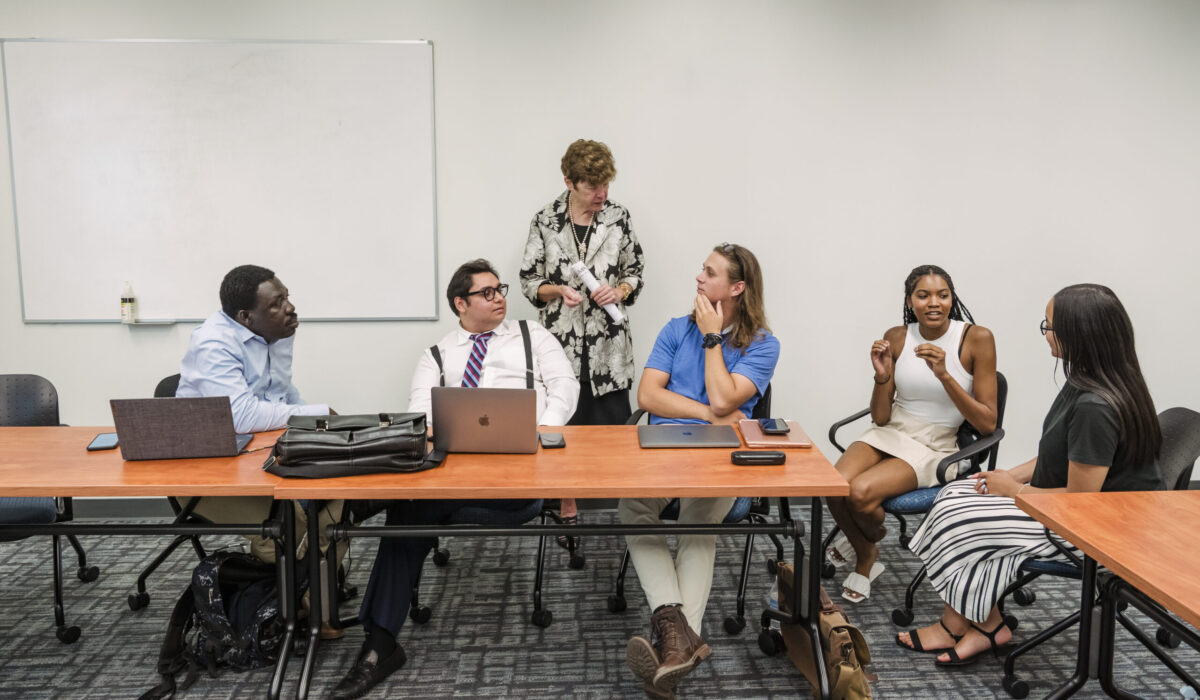
Bassetti’s research resulted in “An Evaluation of Medicaid Expansion through the Affordable Care Act and Its Effects on Chronic Disease Death,” with a focus on the three most prevalent chronic diseases that lead to death—diabetes, cancer, and heart disease.
“I felt lost for the first week trying to sort through sources and data,” shares Bassetti. “I talked to Dr. Miller. She knows everything. In less than 20 seconds, she guided me towards the appropriate resources for the question I was exploring.” Bassetti began to understand that conducting research of this scale involves making numerous small decisions to find, analyze, and interpret large datasets. Kang advised Bassetti to be as precise as possible in his approach. “She helped me find my way, the purpose of my findings, and what I wanted to achieve,” explains Bassetti. “Dr. Kang showed me what didn’t make sense but not how to fix it. She wanted to engage my thought process, and it worked.”
Building a research community
The first year of funding established the undergraduate summer fellowship, supported graduate and doctoral research, and two faculty research projects. At UMBC, Zoë McLaren, associate professor of public policy, Mir Usman Ali, assistant professor of public policy, and Miller researched “COVID-19 in adults with disabilities: Disparities in prevalence, health care access and use, and employment.” At UB, Zhang and Kang conducted a study on “The experience of SSDI beneficiaries in the two-year waiting period for Medicare.” Graduate and doctoral students at Brandeis University, Harvard University, and the University of Wisconsin-Madison began their research in retirement, disability, and health policy in institutions across the U.S., including UMBC public policy doctoral student, Shadi Seyedi.
This fall will begin the second year of funding. McLaren, Usman Ali, and Miller proposed to continue their project. Miller and Kang requested funding to begin working on a new research project “Identifying Disparities in and Potential Facilitators to Receipt of SSDI.” Graduate and doctoral students will have opportunities to share their research throughout the academic year. Seyedi will present her research “Evaluating the Effects of Affordable Care Act on Health Care Coverage, Utilization, and Outcomes: A Comparison of Foreign-born and US-born Populations” at UMBC’s Judith A. Shinogle Memorial Award Lecture this November.
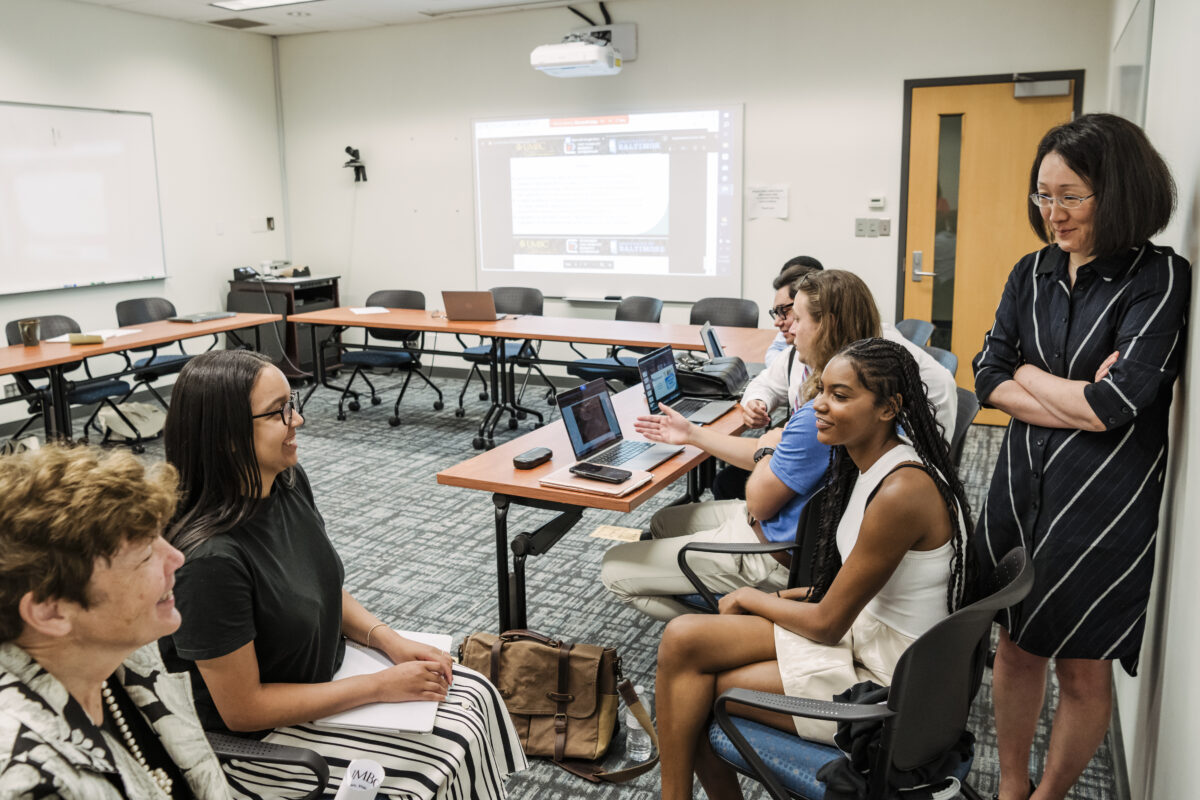
Miller, along with the co-directors and collaborators, emphasizes that the essence of the cooperative agreement is creating a new multigenerational and diverse network of researchers and community partners invested in advancing research on SSA programs. Learning, mentoring, research, and disseminating knowledge are communal, ongoing, and fluid processes.
“It’s important to learn from Nancy. She is a leading expert in health policy, disability and long-term care, health disparities, and aging policy. Her dedication extends beyond her research. She genuinely cares about her students and the populations she studies,” says Kang. “Fellows understand that our support extends beyond their academic performance to their overall growth and well-being. This project represents a lasting tradition of mentorship and teamwork, shaping the future of research in retirement, health, and disability.”
To learn more about the program or to apply contact Melanie Keys, UMBC SSA program manager, MKeys1@umbc.edu.
2024 – 2025 Application deadlines:
Undergraduate and Masters Summer Research Fellowship Program, April – May
Masters and Doctoral Student Research Grant Program, November – December
Doctoral Student Mentored Pilot Studies Program, April – May

